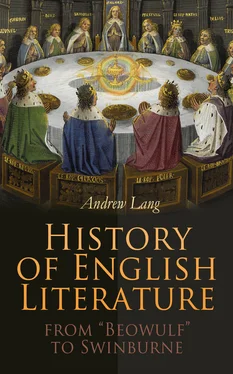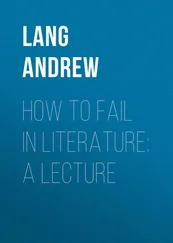But twenty wintir passed continuelly
Excesse at borde hath leyd his knyf with me.
The great number of public-houses excite people to drink,
So often that man can nat wel seyn nay.
He would have drunk harder if there had been more money in his pouch: had Occleve been a richer man there would be less of the rhymes of Occleve. He liked the society of gay girls, which is expensive,
To suffre hem paie had been no courtesie.
He abstained from discourteous language,
I was so ferd with any man to fighte.
The tapsters said that Occleve was "a real gentleman," "a verray gentil man". He was too lazy to walk to his office; this indolent civil servant, he took a boat, and the oarsmen knew and flattered him. He is rather impudent and impenitent, but he seems to ask for no more than was his due in the way of money. The picture is drawn from the life, whether dramatically studied, or only too truly told of Occleve.
Being what he calls himself, Occleve wrote over 5000 lines of good moral advice to "the mad Prince," the friend of Poins and Falstaff (1411-1412). He acts as his own "awful example". He asks for money, and his poem is a compilation from various musty sources; but he is always laxly autobiographical, a loose, genial, familiar knave. Conceivably he may have met the Prince in a tavern; it is a pity that Shakespeare did not think of bringing this shuffler, in Falstaff's company, to take purses at Gadshill. He bids the Prince to burn heretics, and, in the interests of peace with France, to marry Katharine, daughter of the mad Charles VI. Henry took both pieces of advice, but the marriage brought not peace, but the sword in a Maiden's hand.
Like Villon, Occleve wrote a poem (more than one), to the Blessed Virgin: he is always very orthodox. He had an interval of darkened mind, but recovered and went on versifying, a pathetic figure, for he was a married man, and his wife must have endured things intolerable. Occleve was very human: as a poet his versification is as loose as that of Lydgate. He died about 1450.
Stephen Hawes was the last of the English followers of Chaucer who deserves notice. Between him and the genuine Middle Ages a great gulf exists. The art of printing is familiar to Hawes. Writing of Chaucer he says of the poet's many books
He dyd compyle, whose goodly name
In printed bokes doth remayne in fame ,
where the jostling vowels of "name," "remayne" and "fame" prove Hawes to be a careless author. In his own time, he says, writers "spend their time in vainful vanity, making balades of fervent amity, as gestes and trifles without fruitfulness". Hawes alone "of my Master Lydgate will follow the trace".
Hawes is all for allegory and moral instruction in his long poem, misleadingly entitled "The Passetyme of Pleasure". All the old formulæ of the Romance of the Rose are retained, and the castles of Rhetoric, Logic, and the whole curriculum of Learning are not much more joyous than the den of Bunyan's Giant Despair. Even combats with seven-headed monsters fail to excite pity and terror, for Hawes has seen, in a work of art, his own future, and we know beforehand that Grand Amour married La Bel Pucell.
Hawes was born about 1475, was over-educated at Oxford, and was Groom of the Chamber to Henry VII. He made the words of a ballet for the Court in 1506 (ten shillings) and, for Henry VIII. (1521) a play, now lost, (£6 13s. 4 d.). He also wrote "The Example of Virtue," and several poems, some of which have not been found in print or manuscript. The "Passetyme of Pleasure" is of 1506. It is in rhyme royal, with more or less humorous interludes concerning the facetious Godfrey Gobelive, a dwarf who tells tales against women, in rhyming "heroic" couplets. "The Example of Virtue," another moral and allegorical poem, is in the same measures. Spenser may have known the works of Hawes, there are coincidences in the allegorical details of both which can scarcely be all accidental. Hawes, in a sense, would "have raised the Table Round again," if he could I He knew Malory's great prose work, the "Morte d'Arthur," and would fain have restored ideal chivalry.
But chivalry died at the burning of Jeanne d'Arc, under the eyes of "the Father of Courtesy," the Earl of Warwick. The Flower of Chivalry was sacrificed like Odin, "herself to herself" (1431).
Hawes was a chaotic versifier: it is not easy to guess how he scanned many of his own lines. In the "Passetyme" the words of the hero's epitaph are probably a versified proverb,
For though the day be never so longe,
At last the belles ringeth to evensonge.
Long were the poems, and long the day of the followers of Chaucer. Now for its even song the bells were rung.
CHAPTER XII.
LATE MEDIAEVAL PROSE.
Table of Contents
As far as literature is concerned the poetry of the period which we have been considering is infinitely more important than the prose. For most prosaic purposes, Englishmen still wrote in Latin: Richard Rolle, that eccentric hermit, and Wyclif, the premature Reformer, were even more prolific in Latin than in English. Prose was used in writing of science, as in Chaucer's treatise concerning the Astrolabe; for translation out of Latin, as in Chaucer's translation of Boëthius, and Trevisa's rendering of Higden's chronicles; in sermons, and by Wyclif and his followers for their tracts against the rich; against the Friars; against the endowments of the Church (constantly threatened in Parliament); and against the Catholic doctrine of the Eucharist; and for their translations from the Latin Bible.
John Wyclif (born about 1329) was a man of great influence in his day; and the Reformation, when many of his ideas revived, probably found the embers of the fire which he had tended still glowing. He is said to have been born at Hipswell, near Richmond in Yorkshire, and certainly was of the Diocese of York. He was Master of Balliol College, Oxford, in 1361. In 1372 Wyclif took the degree of Doctor in Theology: he had already written not a few Latin treatises on philosophical subjects. As a philosopher he was a believer in predestination (on which much might be said), but averse to the theory of the disintegration of matter; indeed his views on this subject controlled his theory of the Eucharist. His desire to reform the Church by reducing her endowments endeared him to a political party in the State; and when he was summoned before Convocation in 1377, he was supported by John of Gaunt, uncle of Richard II.
The affair ended in a brawl; and in a later examination his ideas were not pronounced heretical. The London mob as well as some persons of high rank were on his side, and when one Pope, Urban, proclaimed a crusade against the other Pope, Clement, Wyclif opposed it in manuscript pamphlets. He had, about 1378, started a kind of order of "poor priests" who spread his doctrines, and, in regard to the unlawfulness of owning private property, went beyond him.
The Bible, not the tradition of the Church, was the centre of Wyclif's inspiration: it would be a mistake to suppose that the Bible was then generally ignored, the literature of the time is full of quotations from Scripture. There was no authorized translation of the Latin Bible, but many separate books of Scripture were circulating in English. There is much controversy as to whether or not Wyclif translated, or caused to be translated, the entire Bible, as a chronicler declares that he did: certainly he made much of it known in English tracts and sermons.
In 1382 he was suspended from teaching at Oxford; he retired to his rectory at Lutterworth, continued to write, and died on Old Year's Day, 1384.
It is impossible, here, to enter into theological details, but Wyclif anticipated many of the great multitude of ideas which flooded Western Europe at the beginning of the Reformation. If we open his sermons at random, we find him preaching on Lazarus and Dives, "how richessis be perilouse, for lightli wole a riche man use hem unto moche lust," that is, luxury. Words of Latin origin are nearly as common in his style as in that of Chaucer or Piers Plowman. In his Englishing of the Bible, Wyclif uses "And" at the beginning of many sentences, just as Mandeville does in his amusing and fabulous "Travels". The sermons have the double merit of being very short, and very plain, with no rhetorical flowers. The tracts can scarcely be called amiable: the word "stinking," for example, is not thought by Wyclif too strong to apply to "proud priests of Rome and Avignon".
Читать дальше












